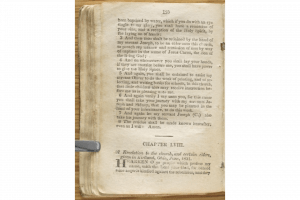Historical Context and Background of D&C 56
Brief Synopsis by Steven C. Harper
Think of section 56 as an emergency mission transfer. In section 52 Ezra Thayer had been called as Thomas Marsh’s companion on a mission to Missouri. Thomas got ready to go as called. Ezra balked. The same revelation called Newel Knight and Selah Griffin as companions to the same mission. When the Saints from New York were not able to stay on the Copley farm and the Lord directed them to move on to Missouri in section 54, he called Newel Knight to remain as their leader. So Thomas Marsh and Selah Griffin needed new companions. The Lord assigns them to each other in section 56.
Some readers are disturbed by this section; others like it when the Lord changes course. How can that be, some wonder, if the Lord is always the same and knows everything? It seems inconsistent. Close reading of section 56 and revelations related to it shows it to be consistent with the Lord’s way, however. He locates agency in individuals and then responds, as needed, to the way those people choose to act. Leman Copley could have kept his covenant to let the New York Saints settle on his land, freeing Newel Knight to go on the Missouri mission. Ezra Thayer could have accepted the call to go with Thomas Marsh on the Missouri mission.
If the Lord had simply used his foreknowledge to avoid calling them to the work, they could not be free to choose whether to obey his will or not. He would have predetermined their choices instead of empowering them to choose for themselves. The Lord knew well when he called Ezra that he would have to choose to “humble himself” and that he would join Thomas only “if he be obedient to my commandments.”1 Moreover, the Lord revoked the commandment for Newel to be Selah’s companion “in consequences of the stiffneckedness of my people . . . and their rebellions.”2
Thomas Marsh and Selah Griffin obeyed section 56. As Thomas put it, they “journeyed to Missouri preaching by the way.”3 From the beginning of the Restoration, the Lord has extended calls to people who will not accept them or who fail to fulfill them. The Lord revokes the refused callings and rearranges assignments, and the work gets done without the help of the unwilling. That’s a vastly superior plan to never calling anyone who might fall short or refuse to serve. Revelations like section 56 honor our choices and prophesy their sometimes painful consequences.
1. “Revelation, 15 May 1831,” p. 85, The Joseph Smith Papers, accessed September 2, 2020.
2. “Revelation, 15 June 1831 [D&C 56],” p. 92, The Joseph Smith Papers, accessed September 2, 2020.
3. “History of Thomas B. Marsh, Written by Himself,” Church History Library, Salt Lake City.
Additional Context by Casey Paul Griffiths
From Doctrine and Covenants Minute
Thomas B. March and Ezra Thayer were both called by revelation to travel to Missouri (D&C 52:22). This revelation was received just days before the elders called in the revelation had planned to depart from Kirtland to begin their journey. Complications arose when Thayer said that he would have to delay his departure for the mission. We do not know the precise reason why Thayer had to delay, but it is likely that the situation was linked to his investment in a piece of real estate. Doctrine and Covenants 56 refers to a “former commandment” given to Thayer “concerning the place upon which he lives” (D&C 56:8). This revelation was not placed in the Doctrine and Covenants but is found in Revelation Book 1 (Revelation, 15 May 1831, JSP). Ezra appears to have been concerned over his duties on the Frederick G. Williams farm, where Joseph Smith’s family was staying at the time. The property was being shared by at least three different parties, and Thayer apparently wanted his payment on his portion of the land secured before he left on his mission (D&C 56:9).
Thomas B. Marsh recorded his perspective on the controversy, writing, “In June 1831 I received an appointment to go to Missouri with Ezra Thayer and preach by the way. In consequence of Ezra Thayer delaying for so long, I went to Joseph who received the word of the Lord appointing Selah J. Griffin with whom I journeyed to Missouri preaching by the way” (Cook, Revelations of the Prophet Joseph Smith, 88). John Whitmer simply recorded, “Thomas [B.] Marsh was desirous to know what he should do as the Lord had commanded him & Ezra Thayer to take their journey to the land of Missouri, but Thayer could not get ready as soon as Thomas wanted that he should” (Revelation Book 1, 91, JSP).
See “Historical Introduction,” Revelation, 15 June 1831 [D&C 56].
See also, “Historical Introduction,” Revelation, 15 May 1831.

